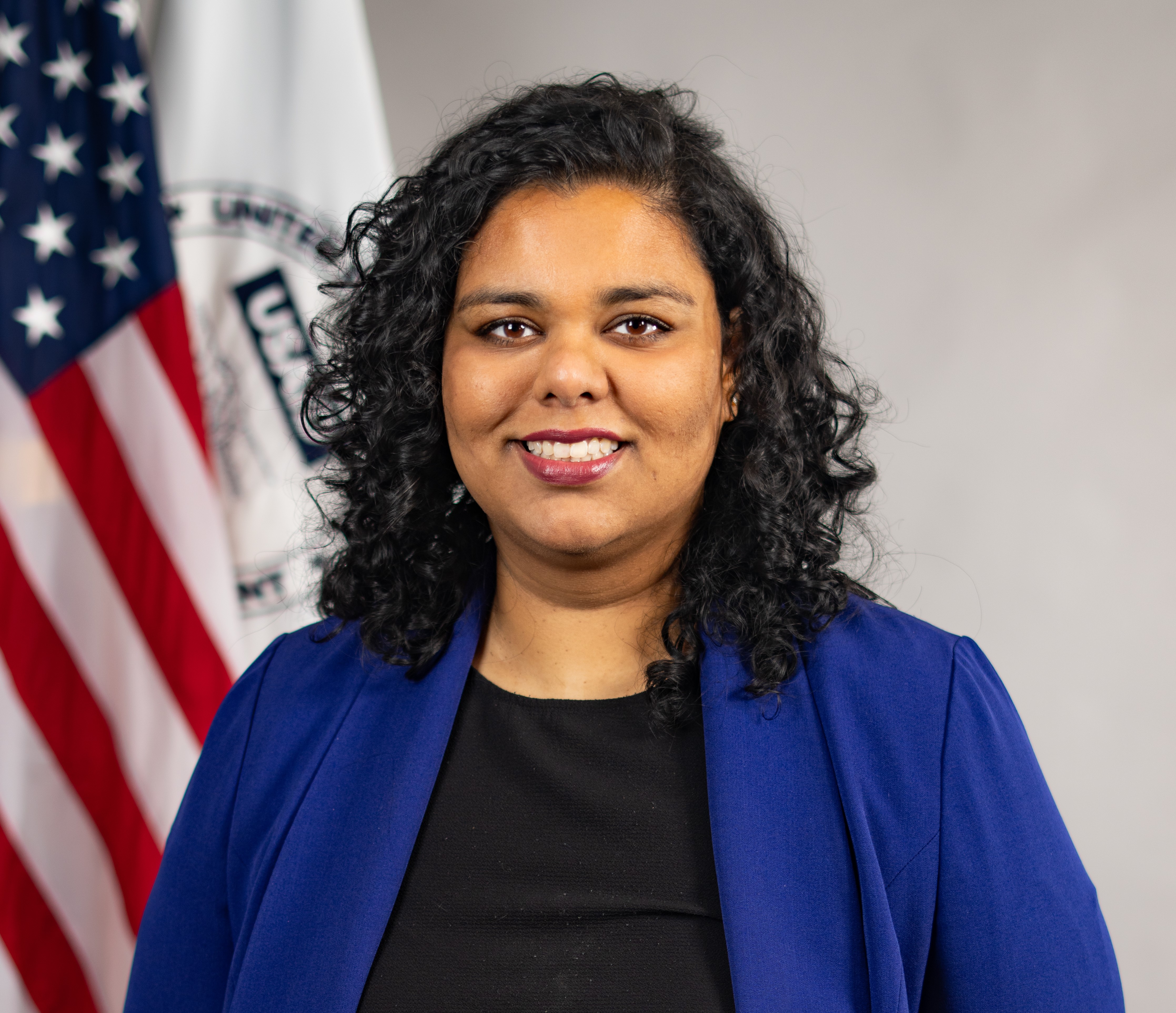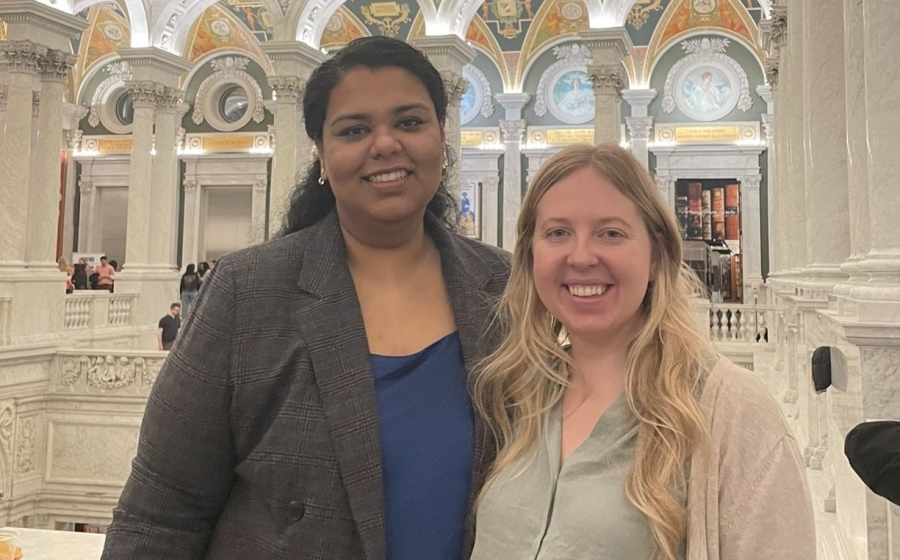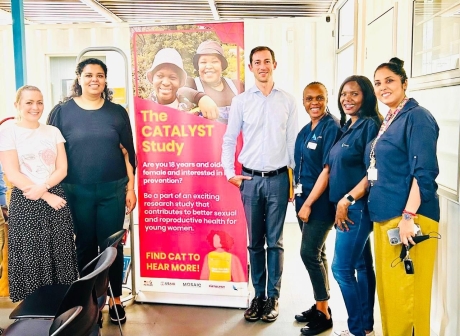Alumni Profile: Anita Dam

Anita Dam, MSPH ’18, is a Health Science Specialist in the Office of HIV/AIDS at USAID, working on expanding access of biomedical prevention technologies. Her work focuses globally in the areas of sexual and reproductive health (SRH) and HIV integration, particularly working on designing and managing implementation and behavioral science research, conducting mixed methods evaluations, and development of guidelines and policy.
Anita earned a Bachelor of Arts in 2015 from Johns Hopkins University, an MSPH in 2018 from the Johns Hopkins Bloomberg School of Public Health, and recently started the DrPH program at the Bloomberg School.
What projects are you currently working on?
Most recently I was working on increasing HIV prevention options for women and adolescent girls in LMICs, specifically introducing new types of long-acting PrEP onto existing service delivery programs with oral PrEP. We are using implementation science research to create a platform of ‘choice’ for women, so they have access to all three options -- oral PrEP, the new two-month injectable PrEP, and a monthly vaginal PrEP ring.
How long have you been at USAID?
I have been at USAID for about 6 years. I started in 2018 as an intern and then a Research Analyst in the Office of Population and Reproductive Health, where I worked on biomedical and behavioral research to increase options of family planning methods and strengthen reproductive health education in communities. About two and half years ago I moved over to USAID’s Office of HIV/AIDS to focus more on HIV prevention research and programs under PEPFAR (the United States President's Emergency Plan for AIDS Relief).
What was your journey like to get to where you are now?
My parents took my brother and me on trips to India and Bangladesh when we were growing up so we could learn about where they grew up and our cultural history. During these annual visits, we would regularly volunteer with community organizations which were geared towards improving the environment (access to education, clean water, food security, etc.) of children, women, and people with disabilities. I consider these trips along with my high school’s significant emphasis on community service to be formative experiences and the start of my journey even though I did not realize it at the time.
For my bachelor's, I majored in the History of Science, Medicine, and Technology, which gave me a base understanding of the history of public health, its complicated entanglement with colonization, and how the field as evolved since then. After I graduated, I spent a year working in the pharmaceutical industry only to realize I wanted to continue exploring public health, especially global health.
During my master's in International Health in the SBI Program, I had a few different opportunities that helped shape my interests and career. I worked with Caitlin Kennedy, PhD ’09, MPH ’04, and Teresa Yeh, MSPH '16 as a research assistant on the Evidence project, I had the opportunity to be a student co-investigator at the Rakai Health Sciences Program in Kalisizo, Uganda, and I interned at the WHO working on SRH/HIV linkages. All these experiences were a really good way to delve into the evidence on HIV, family planning, and sexual and reproductive health globally, and learn how to synthesize the evidence for policy and guideline development.
At the end of my master's, I started interning at USAID’s Office of Population and Reproductive Health, and then continued in different positions at USAID until now.
Can you describe a bit about your experience in the Department? Maybe a few favorite memories or moments?

Anita with her recent USAID intern, Kristen Pollick, '23, celebrating Kristen's last day of her internship at the Library of Congress. Kristen is also a fellow SBI alumna.
I think if you ask any SBI alumni, they will tell you that SBI is a really strong and supportive community. The faculty are super encouraging and always ready to help, advise, and collaborate. I still regularly email with Elli Leontsini, MPH ‘88, my MSPH advisor, and Caitlin Kennedy, my practicum advisor, for career advice, collaborating on research, putting forward conference proposals, and figuring out opportunities for current SBI students.
My cohort was close with each other too, and over 5 years later we are still in contact with each other, hyping each other up, and running into each other in around the world. I think making those natural connections within the cohort and the SBI alumni network made my time special, we all have a common understanding and similar philosophies on why we are doing the work we are doing. I also had the oportunity to ‘pay it forward’ as a SBI alumna; in the past year, I supervised two current SBI MSPH students as USAID interns, and it was a very gratifying experience for me, and hopefully them too!
How else do you think SBI prepared you for the work you do postgrad?
What really stood out for me is SBI’s strong focus on mixed methods training; the qualitative methods series complemented the required quantitative methods classes. It has been an incredible asset to have this training, especially in my current job, I do a lot of evaluations of our programs and funding, so I am constantly using the skillsets that SBI taught me.
I also really liked how the SBI seminar series was practice-based, and the instructors had us apply the qualitative methods in the design and evaluation of a Baltimore-based organization. My team worked directly with the Outward-Bound organization over the course of a year to see if the program had an impact on increasing agency for youth through their outdoor leadership programs. We had to design a mixed-methods evaluation, gain IRB approval, design and use the data collection tools, conduct data analysis, and present the final report. This type of hands-on, practical experience only helped in my work.
Do you have any lessons learned in the transition to your graduate program that might help students?
My suggestion is to take as many methods-related courses as you can because those skills are transferable no matter what you end up doing. In any job, whether it’s research, policy, or programming spaces, a strong foundation in methods is very valuable.
Also, get involved in anything that interests you whether it’s research, clubs, or a local organization, because maximizing the opportunities through [Johns] Hopkins is going to bolster your practical education and knowledge of public health.
Lastly, network! Do not be shy about it, and always attach your resume to any introductory email. If you use Linkedin, make sure to send a message along with the invitation to connect.
Is there anything you are currently working on that you can share, any publications or upcoming articles?

Anita's recent work trip to Johannesburg, South Africa, visiting implementation science study sites to expand access to HIV PrEP products.
Here is a recent USAID blog my team published on the multi-country implementation science study to introduce new PrEP products that I mentioned earlier. The blog explains the importance of using implementation science and mixed methods research to bridge research with programs: Catalyzing the next generation of HIV prevention: From implementation science to program integration
Also, sharing a recent publication in PLOS Global Public Health, titled "Barriers and facilitators to utilizing HIV prevention and treatment services among migrant youth globally: a scoping review". This paper was led by a fellow SBI alumni Kevin Li, ’23, during his USAID internship under my supervision. The paper looks at the unique barriers migrant youth face to accessing HIV treatment and prevention services, and discusses how future implementation science research, enabling policies, and adapted programmatic interventions should prioritize migrant youth as a distinctive sub-population to receive targeted HIV services.
Final question, what excites you about the future of global health?
The conversation around sustainability of global health since the pandemic is something that excites me. Prioritizing sustainability goes hand-in-hand with integration of health sectors, both services and funding, along with the greater dialogue about decolonizing public health. I am excited about USAID’s priority on localization (read more here) and increasing the agency of in-country, local partners to lead global health work. Discussing the shift of power dynamics is not the easiest topic, but starting to have these conversations will be impactful in the long run, especially as we try to create more sustainable systems.
Disclaimer: The views and opinions in this interview are those of the interviewee and do not necessarily represent the views of USAID, PEPFAR, or the United States Government.
Published May 10, 2024
